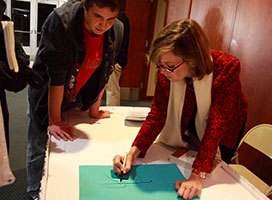Amity Shlaes Gives Lecture on US Economy
Author, columnist: Government is "over-spending, over-regulating, over-reacting"
The board game "Monopoly," popularized in the United States during the depths of the Great Depression in the 1930s, can help explain the nation's current economic problems, according to author and columnist Amity Shlaes, in an October 15 lecture at Knox College.
"Monopoly" isn't just about real estate, Shlaes said. "The bank is very important. It doesn't have to be perfect...just not too bad. If the bank cheats you, or is too jumpy, you walk away from the board."
During the 1930s, and again today, Shlaes said, the nation's bank -- that is, the U.S. government and the Federal Reserve System -- are over-spending, over-regulating and over-reacting, and that's causing people to withdraw from the economy, to "walk away from the board."
 While the government didn't cause the Great Depression, governmental actions lengthened it, Shlaes said. Her lecture reviewed events that she covers in detail in her latest book, The Forgotten Man: A New History of the Great Depression. Among them:
While the government didn't cause the Great Depression, governmental actions lengthened it, Shlaes said. Her lecture reviewed events that she covers in detail in her latest book, The Forgotten Man: A New History of the Great Depression. Among them:
- President Herbert Hoover did too much, not too little, at the onset of the Depression. "He knew that protectionism was bad, but he signed the Smoot-Hawley tariff that made the Depression worse... He told businesses not to lower wages, so people could keep shopping," but the result was business stopped hiring.
- In a case on real estate foreclosure, "the U.S. Supreme Court said that a mortgage contract means less than economic stress," but when contracts are no longer enforceable, banks stop lending.
- Strong unions "priced labor too high, which caused unemployment."
- President Franklin Roosevelt's Ivy League-educated economic advisors, known as the "brain trust," used "class and credentialism to belittle people" and issued so many regulations that "businesses didn't want to do business any more."
- The belief that "World War II stopped the Great Depression" by prompting a massive increase in government spending is wrong. "When the war came along, government stopped attacking business. Business felt better."
 Shlaes also offered analysis of the current Great Recession:
Shlaes also offered analysis of the current Great Recession:
- The "Real Estate Bubble" was caused by "the culture that says everyone should own a house, even if they can't afford it."
- Fannie Mae and Freddie Mac -- government-sponsored entities that backed high-risk mortgages -- were "like 'The Sopranos'... too big and too powerful... if it's too big to fail, it's too big."
- The Federal Reserve was too arbitrary in deciding which businesses would be rescued and which would fail.
- "Stimulus spending" is being wasted. "The problem is the government just throws money at things."
- "There are infrastructure projects that are worthwhile, [such as] railroads... Republicans make fun of railroads, but they're wrong."
- Inflation -- the decline in the value of the U.S. dollar is "the crisis behind the crisis... I believe there's going to be another financial crisis, and then we will have to change Social Security. We will have to change Medicare. Sometimes you need a big crisis to have a big improvement."
While on campus, Shlaes met with students for an informal coffeetalk arranged by the Business and Management Program. After the lecture, Shlaes autographed copies of her book, taking a moment to explain a point for a student by sketching a graph of economic trends (photo above) on the back of one of the posters advertising the event.
Founded in 1837, Knox is a national liberal arts college in Galesburg, Illinois, with students from 47 states and 48 countries. Knox's "Old Main" is a National Historic Landmark and the only building remaining from the 1858 Lincoln-Douglas debates.
Published on October 16, 2009




 While the government didn't cause the Great Depression, governmental actions lengthened it, Shlaes said. Her lecture reviewed events that she covers in detail in her latest book, The Forgotten Man: A New History of the Great Depression. Among them:
While the government didn't cause the Great Depression, governmental actions lengthened it, Shlaes said. Her lecture reviewed events that she covers in detail in her latest book, The Forgotten Man: A New History of the Great Depression. Among them: Shlaes also offered analysis of the current Great Recession:
Shlaes also offered analysis of the current Great Recession: